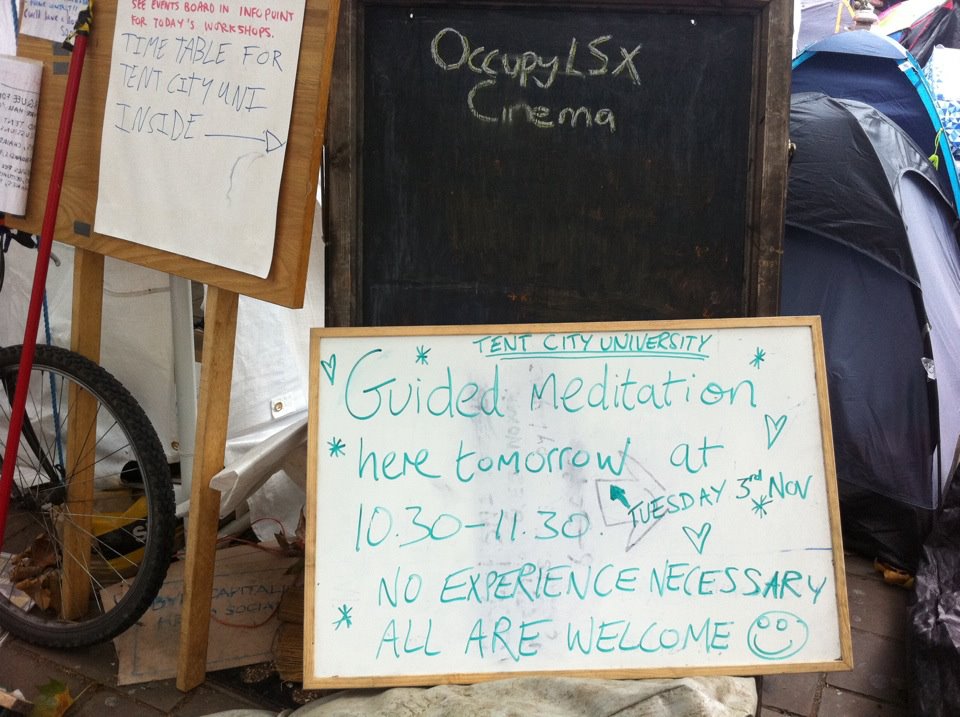Occupy your heart chakra
 Today is November 5th, Guy Fawkes Day, appropriately enough, as the Catholic terrorist has become the symbol for the global Occupy movement, thanks to the ubiquitous Guy Fawkes masks worn by the protestors. Fawkes would have been somewhat heartened by the new law, last week, allowing the British monarch to marry a Catholic (it might have been enough to save Charles I from the chop), although the monarch themselves is still not allowed to be Catholic, as they're also the head of the Church of England.
Today is November 5th, Guy Fawkes Day, appropriately enough, as the Catholic terrorist has become the symbol for the global Occupy movement, thanks to the ubiquitous Guy Fawkes masks worn by the protestors. Fawkes would have been somewhat heartened by the new law, last week, allowing the British monarch to marry a Catholic (it might have been enough to save Charles I from the chop), although the monarch themselves is still not allowed to be Catholic, as they're also the head of the Church of England.
The Church is, clearly, part of the British establishment. So the decision of the Archbishop of Canterbury this week to side with the Occupiers rather than than City of London was both significant and symbolic. It wasn't quite excommunication for the bankers, but it was close. I hear the head of the Alpha movement, former banker Ken Costa, is now setting up a course on ethics and finance, aimed at recruiting young Occupiers.
The British media has also been having a bit of a love-in with the Occupy movement (college kids protesting in tents is much more acceptable than ghetto kids torching furniture warehouses). Even the Evening Standard, edited by the ultra-establishment Geordie Grieg, has been flirting with the movement in its own weird way: it had a fashion shoot at the camp on 'radical chic for the winter of love', and also a two-page spread on a protestor who occupies by night and 'goes to my job at Harper's Bazaar by day'. Huzzah! Anarchism is, like, the new black, yah?

The Occupy movement was the brainchild of Adbusters, the Vancouver-based anarchist collective, who suggested its members plant tents on Wall Street in imitation of the Egyptian tents protests at Tahrir Square. In fact, the 'technology' of tent occupations goes back to Serbia in 2000, where it was used by the Otpor youth movement to topple Slobodan Milosevic. It was then used during the Georgian Rose Revolution and the Ukrainian Orange Revolution, before being picked up during the Arab Spring. The method was actually developed by a Boston academic called Gene Sharp, then taught by the CIA to student protestors in countries where the US wanted to peacefully depose the government. And now the technique has come home to roost. Talk about blowback...

The movement is a major victory for Adbusters, which has been around for over two decades. I interviewed the founder of Adbusters, Kalle Lasn, a decade ago, for my first website, Global Village Idiot. He told me then: 'I believe we are at the beginning of a huge cultural revolution. Years down the road from now, when we've won, I'm sure that some of us will turn into monsters. That's just the way the human spirit works. But nonetheless I believe it's very important for us to win, and worry about how badly we behave later - right now we need to pull the current monster down.'
Talking of revolutionaries turning into monsters, I saw an interesting debate at the 'general assembly' of Occupy London this week. They were debating a motion on whether to give the Tranquility Centre (a group of people charged with maintaining the well-being of the camp) executive powers to eject anyone from the camp who threatened the physical or mental well-being of any other member of the community.  This was quite a delicate moment for the camp. The core agitators behind the Occupy movement are anarchists. They want to create 'a society free from authoritarianism', as a pamphlet put it at the Climate Camp in 2009, which was set up by the same people. The camp is the message. They're not just protesting against authoritarian industrial capitalism: they're living and showing the alternative. In this sense, they're descendants of Diogenes the Cynic, the 4th century BC Greek philosopher who tried to 'deface the currency' of capitalism, and who lived in a barrel in the centre of the Athenian marketplace, to display how liberating such a lifestyle was. The philosopher Epictetus said of the Cynic lifestyle: " 'Look at me, I have no house or city, property or slave: I sleep on the ground, I have no wife or children, no miserable palace, but only earth and sky and one poor cloak. Yet what do I lack? Am I not free of pain and fear?'"
This was quite a delicate moment for the camp. The core agitators behind the Occupy movement are anarchists. They want to create 'a society free from authoritarianism', as a pamphlet put it at the Climate Camp in 2009, which was set up by the same people. The camp is the message. They're not just protesting against authoritarian industrial capitalism: they're living and showing the alternative. In this sense, they're descendants of Diogenes the Cynic, the 4th century BC Greek philosopher who tried to 'deface the currency' of capitalism, and who lived in a barrel in the centre of the Athenian marketplace, to display how liberating such a lifestyle was. The philosopher Epictetus said of the Cynic lifestyle: " 'Look at me, I have no house or city, property or slave: I sleep on the ground, I have no wife or children, no miserable palace, but only earth and sky and one poor cloak. Yet what do I lack? Am I not free of pain and fear?'"
But it's one thing to run an anarchist commune in the relative seclusion of Blackheath, where the Climate Camp was pegged. It's quite another to try and run an anarchist commune in the middle of the city, amid all that noise and pollution, with drunks and tourists wandering through. Imagine trying to run a state with no borders, where everyone has a say, and where the citizenship is constantly changing...During the debate, one of the members of the Tranquility Centre spoke out against the motion: 'Don't give us these powers', he said. 'We don't want them. It should be the collective responsibility of the community'.
Despite his concerns, the motion passed, through a mass showing of jazz hands. 'I'm a gay ethnic minority', said one protestor. 'We need to feel safe'. 'I block the motion!' shouted one skinhead. 'You can't, we've been through the process', said the facilitator. 'Yes I can! I can do what I want. There's no police. So I block it.' 'It's already passed', insisted the facilitator. 'Let's move on.' And so, with one vote, the commune quietly passed from anarchist to...not quite anarchist, and I had a fleeting vision of ten years hence, once the Occupiers have taken control of England, and we have learned to fear a bang on the door in the middle of the night, and the cry: 'Open up! It's the Tranquility Centre!'
The next day, I came back to the Camp to observe, and to show my support. I've been a financial journalist for over a decade, and feel the banks got away with it in 2000, when the dot.com bubble burst, and are in danger of getting away with it again. They've been getting away with it for decades: the Latin American debt crisis, the savings and loan crisis, the Long Term Capital Management crisis, the dot.com crisis, the Swedish banks crisis, the Credit Crunch - over and over, banks get to keep the profits, and leave tax-payers with the losses.
For too long the UK has followed an outdated model of financial capitalism, which leads to huge inequalities, social distrust, poor state services, and a capital city where the only people who can afford to buy houses are foreigners. I would like to help a more human-focused society to grow. But I think British people would only support a 'Scandinavian model' if there was more controlled immigration and much tougher action against free riders and benefit cheats. It goes back to the question being debated by the protestors: what do we give to and expect from our members...and who are our members?
Back at the camp's Tent City University, I found myself caught up in a two-hour workshop on 'acknowledging your emotions'. 'I want you to pair up, and share your feelings' we were told. It reminded me rather of the Landmark Forum, a self-help seminar I had attended two weekends before, as research for my book. We were often encouraged to 'share' there as well. Adam Curtis of the BBC has covered Landmark (or erhard seminar training, out of which it grew) in his documentary, the Century of the Self. He blamed the human potential movement of the 1970s, which gave rise to Landmark, for killing off the Sixties counter-culture, because it turned outward-looking Sixties protestors into the inward-looking self-help freaks of the 1970s. (Watch his take on the human potential movement here, it's two minutes 16 seconds in).
Yet, looking at Occupy, I realized the two movements have now come together: both the revolutionary anarchism of 1968, and the human potential movement of the 1970s. The protestors take classes in meditation, in well-being economics, in 'emotion work' and performance theatre. The personal is tied to the political. Occupy is now the revolutionary arm of the politics of well-being.

Perhaps Curtis is right. Perhaps the Occupy movement is so Utopian that the political takes second place to more unfocused emoting. 'My name's Venus, I've started a global movement of love', one protestor shared with me, before breaking down into tears: she'd been at the camp for two and a half weeks and I think was suffering from advanced sleep deprivation.
Revolutions have always been deeply emotional affairs. Plato first used the word 'privatization' in The Republic, to describe how, in liberal capitalist democracies, our feelings had all been 'privatized' - we never feel collective emotions anymore, except when watching Susan Boyle sing I Dreamed a Dream on Britain's Got Talent. But after the revolution, he suggested, we would all think and feel as one. Rousseau's revolutionary politics was also a politics of collective emotion - the citizens would be magically fused together in the 'General Will'. And they were right: during revolutions, people get brief and intoxicating flashes of that mystical experience - a whole people, thinking and feeling as one. As Wordsworth put it, reflecting on his trip to revolutionary France in 1790:
Oh! pleasant exercise of hope and joy!
For mighty were the auxiliars which then stood
Upon our side, we who were strong in love!
Bliss was it in that dawn to be alive,
But to be young was very heaven!
Perhaps the nitty-gritty of reforms doesn't matter so much. Revolutions are in part a reversion from bureaucratic and technocratic politics to a more primitive emotional feeling of communion. But then, of course, you come down from the high, and go home. Or you might actually gain power...and then you have to work out new bureaucracies, new institutions, new technologies of control when the oxytocin has run away, and the distrust and loathing come back. But sometimes perhaps they still remember those moments...the sacrifice, the discomfort, the camaraderie, the elation: 'you, who were with me in Paris, in Kiev, in Tahrir, do you remember? Do you still feel it?'
On the question of whether Occupy is more about unarticulated emoting, as opposed to particular ideas or beliefs, check out this trailer...
